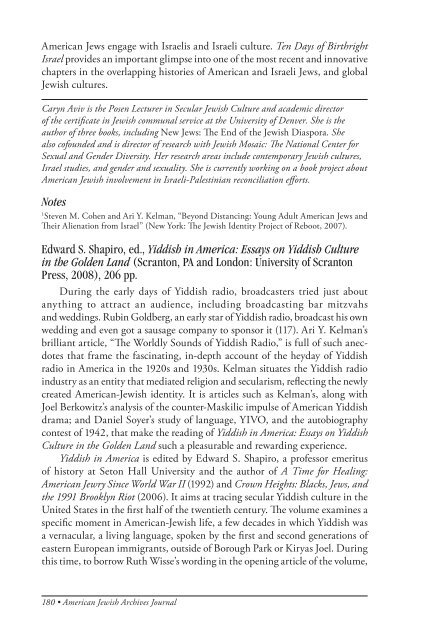The American Jewish Archives Journal, Volume LXI 2009, Number 1
The American Jewish Archives Journal, Volume LXI 2009, Number 1
The American Jewish Archives Journal, Volume LXI 2009, Number 1
You also want an ePaper? Increase the reach of your titles
YUMPU automatically turns print PDFs into web optimized ePapers that Google loves.
<strong>American</strong> Jews engage with Israelis and Israeli culture. Ten Days of Birthright<br />
Israel provides an important glimpse into one of the most recent and innovative<br />
chapters in the overlapping histories of <strong>American</strong> and Israeli Jews, and global<br />
<strong>Jewish</strong> cultures.<br />
Caryn Aviv is the Posen Lecturer in Secular <strong>Jewish</strong> Culture and academic director<br />
of the certificate in <strong>Jewish</strong> communal service at the University of Denver. She is the<br />
author of three books, including New Jews: <strong>The</strong> End of the <strong>Jewish</strong> Diaspora. She<br />
also cofounded and is director of research with <strong>Jewish</strong> Mosaic: <strong>The</strong> National Center for<br />
Sexual and Gender Diversity. Her research areas include contemporary <strong>Jewish</strong> cultures,<br />
Israel studies, and gender and sexuality. She is currently working on a book project about<br />
<strong>American</strong> <strong>Jewish</strong> involvement in Israeli-Palestinian reconciliation efforts.<br />
Notes<br />
1 Steven M. Cohen and Ari Y. Kelman, “Beyond Distancing: Young Adult <strong>American</strong> Jews and<br />
<strong>The</strong>ir Alienation from Israel” (New York: <strong>The</strong> <strong>Jewish</strong> Identity Project of Reboot, 2007).<br />
Edward S. Shapiro, ed., Yiddish in America: Essays on Yiddish Culture<br />
in the Golden Land (Scranton, PA and London: University of Scranton<br />
Press, 2008), 206 pp.<br />
During the early days of Yiddish radio, broadcasters tried just about<br />
anything to attract an audience, including broadcasting bar mitzvahs<br />
and weddings. Rubin Goldberg, an early star of Yiddish radio, broadcast his own<br />
wedding and even got a sausage company to sponsor it (117). Ari Y. Kelman’s<br />
brilliant article, “<strong>The</strong> Worldly Sounds of Yiddish Radio,” is full of such anecdotes<br />
that frame the fascinating, in-depth account of the heyday of Yiddish<br />
radio in America in the 1920s and 1930s. Kelman situates the Yiddish radio<br />
industry as an entity that mediated religion and secularism, reflecting the newly<br />
created <strong>American</strong>-<strong>Jewish</strong> identity. It is articles such as Kelman’s, along with<br />
Joel Berkowitz’s analysis of the counter-Maskilic impulse of <strong>American</strong> Yiddish<br />
drama; and Daniel Soyer’s study of language, YIVO, and the autobiography<br />
contest of 1942, that make the reading of Yiddish in America: Essays on Yiddish<br />
Culture in the Golden Land such a pleasurable and rewarding experience.<br />
Yiddish in America is edited by Edward S. Shapiro, a professor emeritus<br />
of history at Seton Hall University and the author of A Time for Healing:<br />
<strong>American</strong> Jewry Since World War II (1992) and Crown Heights: Blacks, Jews, and<br />
the 1991 Brooklyn Riot (2006). It aims at tracing secular Yiddish culture in the<br />
United States in the first half of the twentieth century. <strong>The</strong> volume examines a<br />
specific moment in <strong>American</strong>-<strong>Jewish</strong> life, a few decades in which Yiddish was<br />
a vernacular, a living language, spoken by the first and second generations of<br />
eastern European immigrants, outside of Borough Park or Kiryas Joel. During<br />
this time, to borrow Ruth Wisse’s wording in the opening article of the volume,<br />
180 • <strong>American</strong> <strong>Jewish</strong> <strong>Archives</strong> <strong>Journal</strong>

















